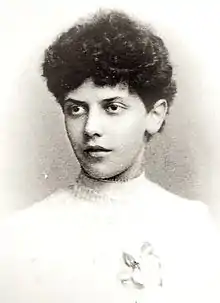Hedwig Bleuler-Waser
Sophie Hedwig Bleuler-Waser (born Sophie Hedwig Waser; 29 December 1869 – 1 February 1940) was a Swiss suffragette who founded the Swiss Federation of Abstinent Women.
Hedwig Bleuler–Waser | |
|---|---|
 | |
| Born | 29 December 1869 Zurich, Switzerland |
| Died | 1 February 1940 (aged 70) Zollikon, Switzerland |
| Nationality | Swiss |
| Education | University of Zurich |
| Spouse | |
| Children | 2 |
Personal life
Bleuler-Waser was born on 29 December 1869 in Zurich.[1] Bleuler-Waser married Swiss psychiatrist Eugen Bleuler.[2] The two met while campaigning for the abstinence movement.[3] The couple did not frequent Church and followed the ideas of the Enlightenment.[4]
Education and career
In 1901 she met Auguste Forel, a Swiss myrmecologist, neuroanatomist, psychiatrist and eugenicist, and at his suggestion, she founded the Swiss Federation of Abstinent Women.[1][5] She chaired the Federation as president until October 1921.[6] Together with her five children, she ran social events at the psychiatric hospital her husband, Dr. Eugen Bleuler, worked at, including serving afternoon tea.[7]
In 1907, Bleuler-Waser graduated from the University of Zurich, becoming one of the few women to receive her doctorate.[8] While at the University of Zurich she established lasting friendships with Marie Baum, Ricarda Huch and Marianne Plehn.[9] After completing her doctorate, she taught at the Höhere Mädchenschule in Zürich.[6]
During World War 1, Bleuler-Waser and Else Züblin were involved in the construction of alcohol-free soldiers' offices.[10] In the winter of 1917, she started women's education courses in Zurich.[1] For most of the time Bleuler was working in Burghölzli, between 1898 and 1927, the family lived together in an apartment outside the clinic. The apartment was also home to a secretary and junior doctor.[4] From 1919 until 1937, she led the German-Swiss Ortsgruppenvereinigung (Local chapter of Association).[1]
Selected publications
The following is a list of selected publications:[11]
- J.G. Lavater (1894)
- Ulrich Hegner: ein Schweizer Kultur- und Charakterbild (1901)
- Weihnachtsspiele (1910)
- Die Dichterschwestern Regula Keller und Betsy Meyer (1919)
- Lenzbub kommt (1920)
- Engelchens Erdenjahr : Weihnachtsspiel in fünf Bildern (1926)
References
- "Hedwig Bleuler-Waser". hls-dhs-dss.ch. Historical Dictionary of Switzerland. 6 November 2002. Retrieved 15 October 2019.
- Yoker, Ümit (28 December 2013). "Zerrissen zwischen innen und aussen". Neue Zürcher Zeitung. Retrieved 15 October 2019.
- "Paul Eugen Bleuler (1857–1939)". embryo.asu.edu. Retrieved 15 October 2019.
- Joos-Bleuler, Tina (November 2011). "Being a Member of the Bleuler Family". Schizophr Bull. 37 (6): 1115–1117. doi:10.1093/schbul/sbr135. PMC 3196944. PMID 22013083.
- Heidi Thomann Tewarson (29 August 2018). Die ersten Zürcher Ärztinnen: Humanitäres Engagement und wissenschaftliche Arbeit zur Zeit der Eugenik. Schwabe AG. p. 134. ISBN 9783796538766. Retrieved 15 October 2019.
- "Der Briefwechsel zwischen Ludwig Binswanger und Eugen Bleuler". d-nb.info (in German). 2009. pp. 33–35. Retrieved 15 October 2019.
- Coline Covington; Barbara Wharton (8 May 2015). Sabina Spielrein:Forgotten Pioneer of Psychoanalysis, Revised Edition. Routledge. p. 87. ISBN 9781317458609. Retrieved 15 October 2019.
- Herrmann, Anne (15 April 2014). Coming Out Swiss: In Search of Heidi, Chocolate, and My Other Life. University of Wisconsin Press. p. 143. ISBN 9780299298432. Retrieved 15 October 2019.
- James Martin Skidmore (2005). The Trauma of Defeat: Ricarda Huch's Historiography During the Weimar Republic. Peter Lang. pp. 22. ISBN 9783039107605.
- Schweizer Kriegsnothilfe im Ersten Weltkrieg: Eine Mikrogeschichte des materiellen Überlebens mit besonderer Sicht auf Stadt und Kanton Zürich. Vandenhoeck & Ruprech. 3 December 2018. p. 278. ISBN 9783412512699. Retrieved 16 October 2019.
- "Au:Bleuler-Waser, Hedwig". worldcat.org. Retrieved 16 October 2019.